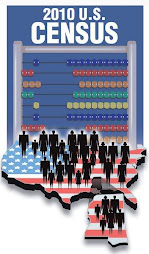From today's Clarion Ledger:
WASHINGTON - It would only be "fair" for the federal government to conduct a special census in the Gulf Coast to count displaced residents who return to the region after the 2010 census, according to the head of the Census Bureau.
The question is: Who would pay for it?
"The fair thing to do for the country is to do another count of that area later on," Robert Groves said in an interview. He said Gulf Coast communities are still working to help residents whose homes were damaged or destroyed to return.
"They're rebuilding. They want more people there. People are coming back."
Census officials, local governments and community groups have raised concerns that the 2010 census count won't include all Gulf Coast residents, particularly those who haven't yet returned after the 2005 hurricanes. Every 10 years, the Census Bureau conducts a constitutionally-required count of residents living in the United States. Residents must be counted where they live on April 1, so displaced Gulf Coast residents will be counted wherever they are living on that day.
Much is at stake for Gulf Coast communities. Census data are used to distribute $400 billion in federal funds and determine the number of seats each state gets in the House of Representatives.
Community activists in the Gulf Coast and national civil rights groups are calling for a special census.
"If they haven't made it home by now, they won't be able to take advantage of their recovery dollars," said Trupania Bonner, executive director of Moving Forward Gulf Coast, a community group helping residents in Alabama, Louisiana and Mississippi.
Groves said the agency has conducted more than 300 special censuses since the last major count in 2000. Many were for communities that had population growth or annexations and were looking for more federal funding, said Pat Paytas, a program analyst at the Census Bureau.
Groves said the bureau could return to the Gulf Coast for a special census if local governments or the state request a count.
But the cost of a special census must be reimbursed and it is unknown whether state or local governments in the Gulf Coast would be willing and able to pay for it.
"If the Census Bureau can get behind doing an interim count of the Gulf Coast region between the 2010 and 2020 census, then that would be a terrific way to be able to gauge how the region is growing," said Audrey Singer, a census expert at the Brookings Institution. "However, the cost and the politics of doing such a count may prevent it from happening."
Groves said he doesn't know how much a special census for the Gulf Coast would cost.
"I'm not saying it's cheap, but somehow other areas have gotten the political will to assemble the money," Groves said. "It is a matter of will."
Groves said the governments could seek federal or private funding.
Marc Morial, chairman of the Census Bureau's 2010 Census Advisory Committee and president of the National Urban League, said Congress could include the cost of the special census in the 2011 budget.
But congressional lawmakers, including Sen. Thomas Carper, D-Del., chairman of a subcommittee that oversees the Census Bureau, have raised concerns about the cost.
Morial, a former mayor of New Orleans, said the count is important to help communities get federal funds to rebuild. "It's something they should do quickly - 2011 at the latest," he said.
But Paytas said the earliest there could be a special count would be 2012.
The Census Bureau is aware of the challenges of doing the 2010 count in Gulf Coast states and is planning to take steps to address the concerns, including going door-to-door in some parts of the region to make sure hundreds of thousands of residents get questionnaires.
Subscribe to:
Post Comments (Atom)

No comments:
Post a Comment